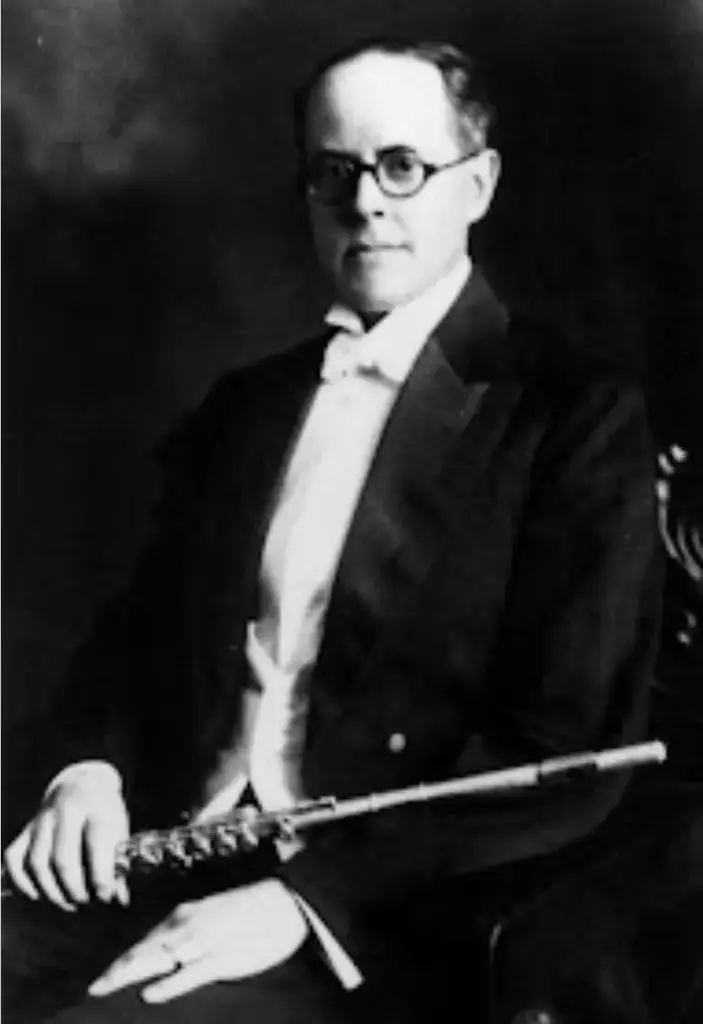
Birthday of Verne Q. Powell (1879 – 1968)
Verne Q. Powell, a master flutemaker, revolutionized the art of flute crafting with his innovative designs and meticulous craftsmanship.
Early Life and Musical Beginnings
Verne Q. Powell was born on April 7, 1879, in Danville, Indiana, into a family of musicians who were also skilled silversmiths. Growing up in Kansas, Powell was encouraged to enjoy music from a young age, beginning with the flute. However, his family’s primary trade of jewelry making and engraving profoundly influenced his future career.
The Spark of Innovation
In 1910, Powell attended a recital in Chicago by the renowned flutist Georges Barrère. Barrère’s performance on a silver flute was a revelation to Powell, who had never encountered such an instrument before. Captivated by its sound, Powell was inspired to create his own silver flute. He ingeniously melted down various bits of silver, including a handful of half-dollars, seven spoons, and three watch cases, to craft the parts for what would become known as the “spoon flute.” This innovative creation marked the beginning of Powell’s journey into flutemaking.
Career with Wm. S. Haynes Company
Powell’s handcrafted silver flute quickly garnered attention, leading to a significant opportunity. William S. Haynes, the owner of the Wm. S. Haynes Flute Company in Boston, Massachusetts, heard about Powell’s instrument and requested to see it. Impressed by Powell’s work, Haynes offered him a job at his shop. In 1916, Powell joined the Wm. S. Haynes Company, where he initially focused on making wooden flutes and piccolos. By 1926, Powell had advanced to the position of shop foreman, overseeing much of the business operations.
Founding Verne Q. Powell Flutes, Inc.
Despite his success at Haynes, Powell aspired to establish his own flutemaking business. In 1926, he left Haynes and the following year, Verne Q. Powell Flutes, Inc. was incorporated at 295 Huntington Avenue in Boston. Powell’s company quickly gained a reputation for producing high-quality flutes, combining his silversmithing skills with his passion for music.
Evolution of Powell Flutes Company
In 1961, Powell sold his company to four employees and retired in early 1962 at the age of 82. Under new ownership, the company continued to thrive. In 1984, Jim Phelan and Rob Viola became the owners, and two years later, Steven Wasser acquired Mr. Viola’s shares, gaining controlling ownership. The company experienced several relocations—from Boston to Arlington in 1970, to Waltham in 1989, and finally to Maynard in 1999. In 2016, Steven Wasser sold Verne Q. Powell Flutes, Inc. to Buffet Crampon, with Francois Kloc becoming the new president. Today, the company operates in Maynard, Massachusetts, employing approximately 50 staff members.
Famous Customers and Notable Instruments
Powell flutes have been favored by numerous renowned musicians, including Eric Dolphy, who played in the bands of Charlie Mingus and John Coltrane, Ian Anderson of Jethro Tull, and astronaut Colonel Catherine “Cady” Coleman. William Kincaid, often referred to as the “father of the American flute school,” was another notable user.
One of Powell’s most iconic instruments is the platinum flute with a sterling silver mechanism, commissioned for the 1939 World’s Fair in New York. This flute was owned and played by William Kincaid until shortly before his death in 1967. In 1986, it was auctioned by Christie’s for $170,000 plus a $17,000 auction house fee, the highest price ever paid for a flute. The same flute was auctioned again at Christie’s in 2009, selling for $37,500.
Legacy and Impact
Verne Q. Powell’s contributions to flutemaking are significant and enduring. His blend of musical talent and silversmithing expertise resulted in flutes that set new standards in quality and innovation. Powell’s legacy continues through the instruments that bear his name, cherished by musicians worldwide. His life’s work remains a testament to the power of combining passion with craftsmanship, leaving an indelible mark on the world of music.
Birthday of Verne Q. Powell

